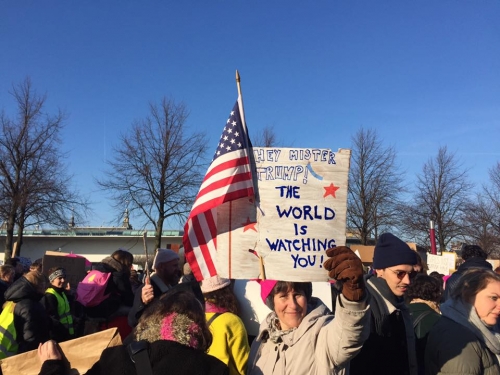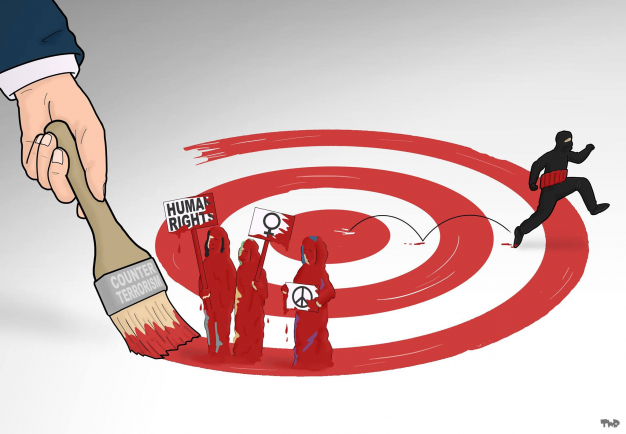Column by WPP Staff
“Nonviolence is a way of life for courageous people. It is a positive force confronting the forces of injustice and utilizes the righteous indignation and spiritual, emotional, and intellectual capabilities of people as the vital force for change and reconciliation.”
– Guiding Principle #1 of the Women’s March
Since the inauguration of President Trump a few weeks ago, we have seen the adoption of a string of executive orders met by an unprecedented counterforce of protests, civil resistance and an outpouring of global solidarity. The Travel Ban[1], Global Gag Rule[2], and the decision to resume the Dakota Access Pipeline[3], to name a few of the executive orders signed by President Trump in his first 30 days, will have a human rights impact that will be felt worldwide. As always, those most vulnerable and marginalized in society will be the first to bear the brunt.

In response to these developments, hundreds of thousands of women, men and children have started marching and standing in protest, reaffirming their common values with strength, clarity and compassion. The Women’s March – which may have been the largest single-day demonstration in US history – and the sustained protests in airports and cities ever since, has helped bring together people from very diverse backgrounds in a joint struggle for justice and human rights.
Time and time again, research has shown the power of nonviolent organizing in addressing injustice and affecting social change[4]. A key ingredient in the success of a nonviolent movement is diversity in participation; its core characteristic of appealing to and actively including people from all walks of life and social identities. Women have historically been at the forefront of countless of these social justice movements, and research has shown that women’s active engagement – in particular when in the form of mass mobilizing - has a direct effect on the building of lasting change and peace.[5]
At a time when global space is shrinking for critical civil society everywhere[6], witnessing and taking part in this on-the-ground-mobilizing is crucial. It serves as an empowering reminder of humanity’s capacity to create change when facing overt manifestations of “Power Over”, via the lived nonviolent concepts of “Power With” and “Power from Within”[7]. This form of “People Power” differs greatly from the many “Power Over” populist statements thrown at us these days, by political leaders claiming to speak on behalf of the people.
This wake-up call is important, since “People Power” increasingly became overlooked as a key ingredient for creating change, in particular by those (cl)aiming to support change in a world marked by systematic injustice, inequality and violent conflict.
As Maina Kiai, UN Special Rapporteur on the Rights to Freedom of Peaceful Assembly and of Association, recently stated: “Social movements are often messy, unpredictable and have long-term visions for social change that are difficult to assess and evaluate. Yet, despite their transformative power, social movements are currently overlooked in donor priorities. The opportunity cost of this business model is far from benign [...] the current funding approach blanks out support for social movements, directly by donors or indirectly by existing organisations, as they are not enabled to seize opportunities as they arise, or to catalyse social movements, which have—throughout history and across cultures—advanced human rights and social justice. Often emerging in times of profound crisis, they reflect the organic demands of ordinary people for recognition, equality, social justice, redress and change.”[8]
Just as the recent surge in nonviolent action across the globe has succeeded in bringing a diverse group of people together, it has also highlighted some ongoing fundamental dilemmas inherent in the current international landscape. Complex global issues - concerning systematic human rights abuses, social injustice and inequality, and armed conflict - too often have become developmentalized and securitized, chopped up in bite-size, short-term projects and programs, with a huge pressure on “producing results” as fast and cost-effective as possible. In addition, institutions aspiring to create change often get caught up in an uneasy political game, torn between serving the interests of (the) state(s) and upholding the principles of human rights.
Nonviolent social movements hardly ever fit such frameworks; nor the practice of uneasy compromising on key principles. As pointed out by Maina Kiai, social movements end up being “over looked, ignored and underfunded. Their galvanizing potential can be lost, often before it is able to properly form”[9].
In a world where donor trends have been reflecting a move away from funding local grassroots organizing and movement building, towards funding bigger and established organizations - which increasingly are being pushed to run like businesses[10] - donors risk being out of touch with the forces of change on the ground.
Being out of touch with people’s needs and concerns is not only a risk in the sense that this has been one of the key factors behind some of the political turmoil we are currently witnessing; it also removes us from working from the level where lasting solutions can be created. The question we have to ask ourselves as international civil society is: Who are we accountable to? Is it the people? And if so, is the support we provide given on the people’s terms? Do our structures and modus operandi enable “People Power” to flourish, or rather end up stifling it, despite our best intentions?
Transformative change requires all of us to be actively involved in creating the world we want to live in. The power to make this a reality flows from the bottom up, and should also be supported as such.
References:
[1] https://www.theguardian.com/us-news/2017/jan/28/trump-immigration-ban-syria-muslims-reaction-lawsuits
[2] https://www.theguardian.com/global-development/2017/jan/26/global-gag-rule-stop-playing-politics-with-womens-lives-msf-tells-trump
[3] https://www.theguardian.com/us-news/2017/jan/24/keystone-xl-dakota-access-pipelines-revived-trump-administration
[4] https://www.theguardian.com/commentisfree/2017/feb/01/worried-american-democracy-study-activist-techniques
11 Dec '17 This month WPP staff interviewed Arbia Jebali and Sarah Chamekh from Free Sight Association in Tunisia about the work their organization does, how civil society space has changed over the years, which challenges they are facing now, and how civil society in Tunisia is organizing itself to overcome those challenges.
7 Nov '17 In this article, WPP staff interviewed Doron Joles of XminY Fund, an activist organization that supports social movements, action groups and changemakers fighting for a fair, democratic, sustainable and accepting world. He discusses the unique way they have chosen to hand out funds, and the challenges that go along with funding small activist organizations in the current global climate.

25 Oct '17 This Friday, the UNSCR 1325 Open Debate will take place once again, seventeen years since the adoption of landmark UN Security Council Resolution 1325 on Women, Peace and Security. In this article WPP staff reflects on the progress made for a truly transformative feminist peace agenda until now.
